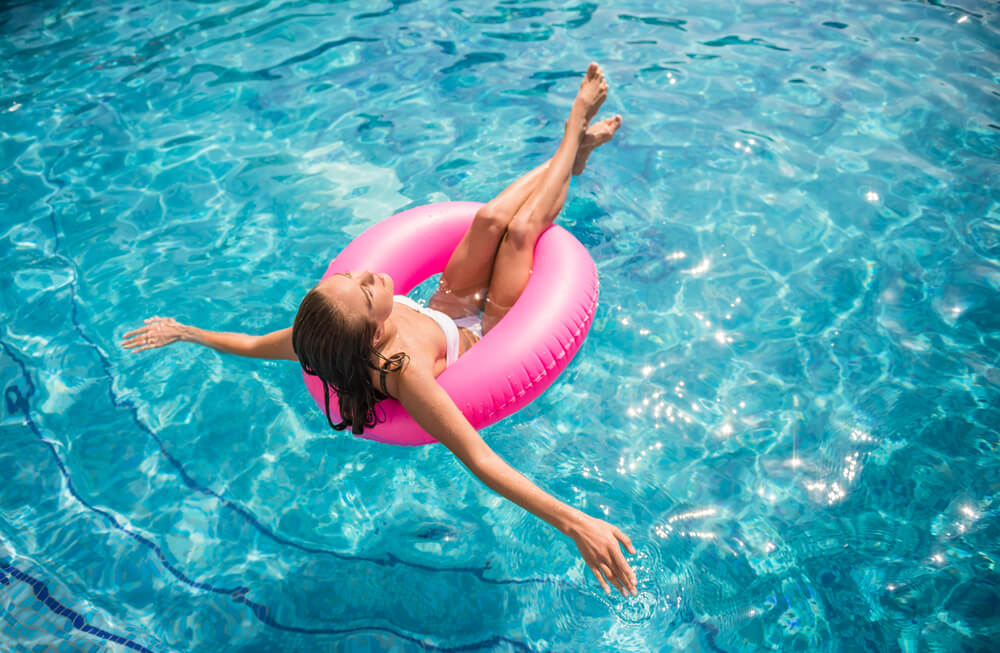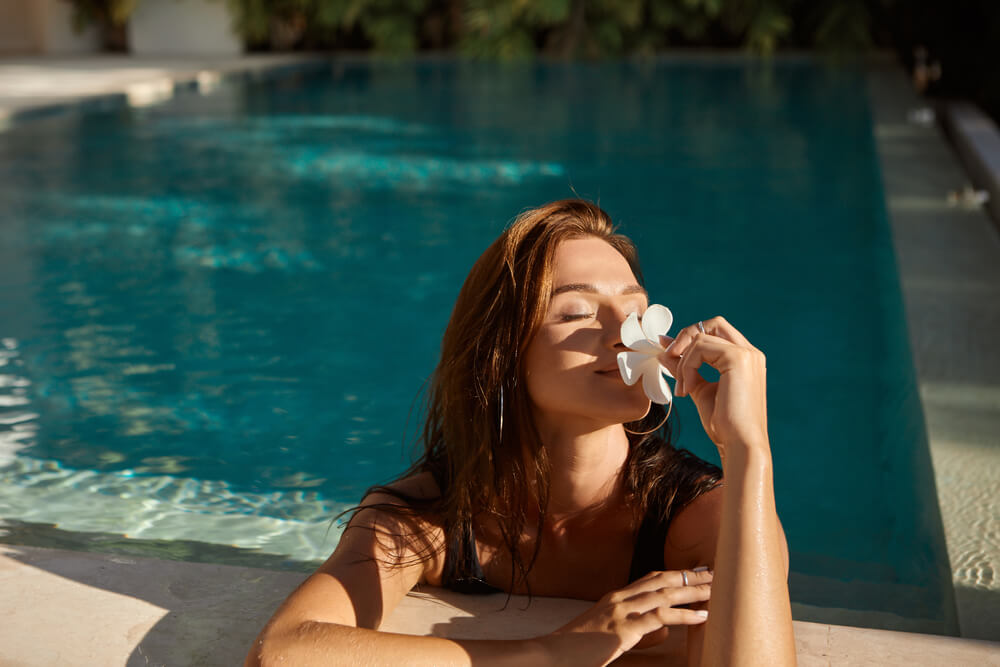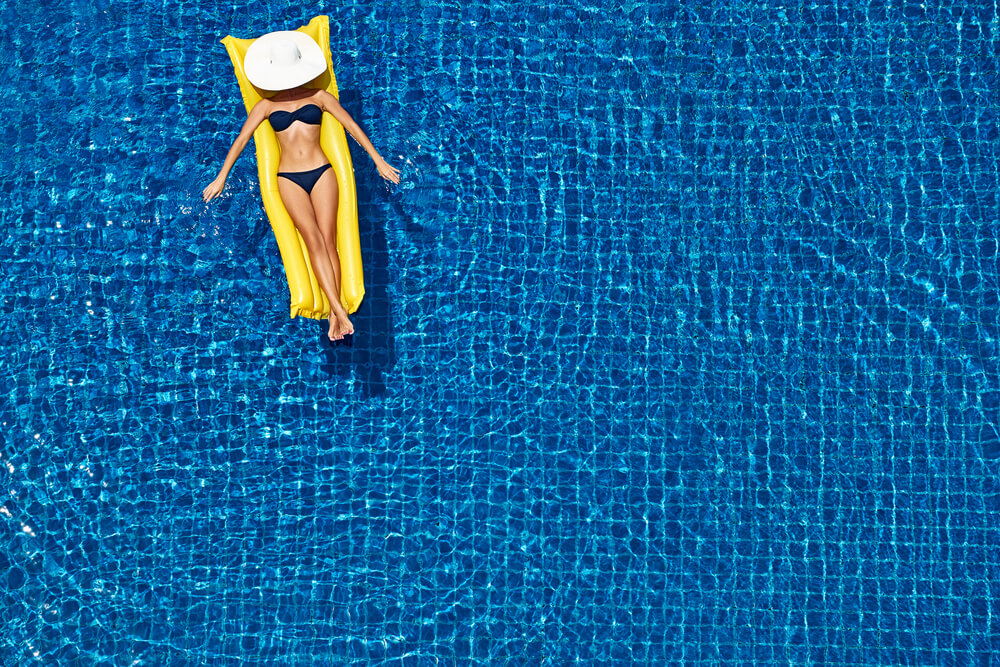Should you go swimming with a menstrual cup while on your period? This, and many more, are pivotal questions that come to mind during that time of the month, especially during the summer, while you’re on vacation. Should you change your regular activities at this time? Fortunately, you don’t really need to change any of your everyday activities just because you’re on your period, and this includes swimming as well.
As you might’ve guessed, our Obstetrics and Gynecology experts in South Miami, Florida, will delve into this topic more in-depth, challenging some of the most common misconceptions women usually have about swimming during their periods.
Swimming During Your Period: Misconceptions

There are a lot of misconceptions surrounding this topic, so let’s get started by getting the facts straight.
It Will Be Messy
Fortunately, you can go swimming while on your period. Still, it’s pivotal to wear a menstrual cup or a tampon to catch the flow. Actually, competitive swimmers have often competed in important events on their periods, and nothing went wrong.
It’s Unsafe
There’s a myth going around that women on their periods who go swimming may be more susceptible to shark attacks, as these predators can smell blood from almost miles away. While their sense of smell is among the best on the planet, there’s no actual scientific evidence that would suggest that women who go swimming during their period are more likely to get attacked by sharks. As a matter of fact, around 80% of shark attacks happen to men.
Cramping Will Become Even Worse
While most women may not actually feel like going for a swim if they are experiencing cramping while on their period, exercise may actually help them relieve the pain.
It’s Unhugienic
To avoid anything messy, experts always recommend swimming with a menstrual cup or swimming with a tampon in these cases. This way, women can ensure that they won’t be any leakage.
Could You Get Infections from Swimming With a Period?
Engaging in swimming activities while menstruating poses no safety risks and does not heighten the chances of acquiring a vaginal infection. Nonetheless, it is possible for chlorinated pools to cause vaginal irritation, potentially leading to the development of yeast infections or bacterial vaginosis (BV). To minimize this risk, it is advisable to promptly shower and change into fresh, dry clothing to reduce prolonged exposure to pool chemicals. Should you notice any unusual changes in your body or have concerns, it is essential to schedule an appointment with your doctor for further evaluation and guidance.
What Products To Use When Simming During Your Period?
To ensure that nothing goes wrong if you choose to go swimming while on your period, the following products can help you have a pleasant beachside experience.
- Menstrual cups: These products are created to catch the flow before leaving the body. You can wear them for longer periods without the need for bringing extra cups, but you will need to wash them, which can become complicated if you are in a public area.
- Tampons: Just like menstrual cups, these are also designed to catch the blood before it leaves the body. The tampon will absorb the flow before it can get to the water. Still, you should change these products every two to three hours to ensure everything goes smoothly.
- Period-proof swimsuits: These swimwear products look just like regular bikini bottoms but have an extra layer that serves to absorb menstrual blood, so wearers don’t have to worry about unexpected leakage.
Preventing Leakage

There are also some misconceptions circulating that state when women enter the water during their periods, the bleeding stops thanks to the water pressure. Naturally, this isn’t true. The pressure may slow the flow down, but the period will still continue. That’s why it’s essential to use menstrual cups or tampons when swimming with your period.
You might have asked yourself: “Can I swim on my period with a pad?” While it may seem safe, experts recommend refraining from pad usage in the water. While they can be great during your period, they aren’t meant for use when you’re swimming. Why? Pads will also absorb the water around you, making them ineffective and even messy on the beach.
On the other hand, cotton and rayon tampons are okay to use while on the beach. These might also absorb some water, but it’s less of a concern than in the case of pads. Remember that you might need to change the tampons every two to three hours while in the water, so be prepared.
Also, don’t forget that tampons are linked to toxic shock syndrome. While these happen rarely, they can occur caused by toxins produced by bacteria. Also, the issue can affect anyone, and most often, it’s associated with:
- Burns and cuts
- Recent surgery
- Viral infections
- The use of contraceptive sponges, menstrual cups, diaphragms, and tampons
The symptoms of this severe complication will usually include the following:
- Headaches
- Sudden fever
- Seizures
- Low blood pressure
- Diarrhea and vomiting
- Muscle aches
- Confusion
- Redness in the mouth, throat, and eyes
- Rashes in the soles and palms that look like sunburn
To lower the risk of toxic shock syndrome, women can follow these simple recommendations:
- Wash their hand thoroughly before and after tampon usage.
- Use the tampons with the lowest absorbency needed.
- Change the tampons regularly.
- Only use them while on your period
- Refraining from reusable tampon usage
- Call the doctor immediately if you experience unexpected symptoms after tampon insertion.
Again, you can also go swimming with a menstrual cup if you want to stay safe. They are usually made of silicone or rubber. They are placed inside the vagina and collect period blood. These cups will need to be regularly removed, emptied, and washed, as they don’t absorb the menstrual flow.
Typically, menstrual cups are safer to use than tampons when assessing possible infection risks. Some of these cups are also reusable, which means lowered costs and less waste when compared to pads and tampons.
Enjoy Your Vacation With Confidence
To sum it up, you can go swimming with a tampon or menstrual cup safely when on your period. You don’t have to avoid having fun in the water just because you’re on your period. All in all, it’s a natural process, and you shouldn’t feel ashamed even if a minor accident does happen.
If you adhere to these safety tips we listed, you can freely enjoy the summer and your vacation, even during that time of the month.
That said, if you want to learn more about your options or generally want to learn more about good female hygiene practices, reach out to us today for a consultation. We’re more than happy to help you get the most out of your summer.


